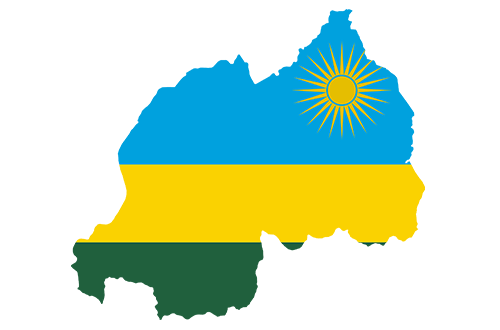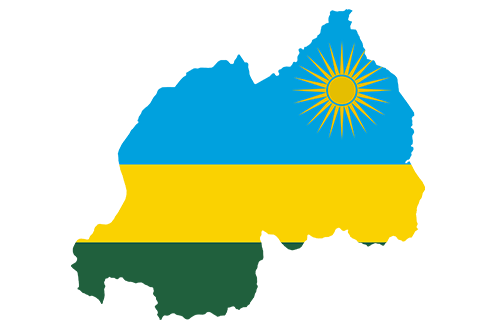
Rwanda is working its way towards become a major business player on the continent.
In the 2014 Global Competitiveness Index – a comprehensive tool that measures the microeconomic and macroeconomic foundations of nations’ competitiveness – Rwanda ranked as the most competitive in the East African region followed by Kenya, Tanzania, Uganda and Burundi. The country ranks favourably in its ability to attract and retain foreign investment.
Rwanda was also last year acknowledged by the World Bank Group in its Doing Business report for its reforms and making an environment conducive to SMEs. It ranks 62 globally, and is now the third easiest place to do business in Sub-Saharan Africa after South Africa and Mauritius.
Located just south of the Equator and bordered by Uganda, Tanzania and the Democratic Republic of Congo, Rwanda’s economy is based mostly on subsistence agriculture, with coffee and tea as major cash crops for export.
With a population estimate of close to 11 million people, the World Economic Forum reports that Rwanda’s 2014 GDP was worth about US$7.4 billion.
The blueprint
The ambitions of this central/eastern African country are outlined in the Rwanda Vision 2020, which was published in 2000. This is an economic blueprint that seeks to transform the country from an agrarian to a knowledge-based economy, and with just five years remaining, provides direction for where the country wants to be.
In 2010 Rwanda’s Ministry of Trade and Industry (MTI) released its Small and Medium Enterprises Development Policy (the last SME policy document). According to the report, the SME sector makes up 98% of all businesses and provides 41% of all private sector employment. Over 80% of Rwandans are engaged in agricultural production, the ministry states.
To strengthen its SME sectors, the MTI says Rwanda has studied and sought to adopt the experiences of countries like South Africa, Tanzania, New Zealand and Malaysia.
The Rwandan MTI also notes that all of these countries, governments have taken the lead in SME development to encourage economic growth.
Key challenges to SMEs growth
According to the MTI, SMEs in Rwanda face many macro-level challenges similar to those faced by large companies, including limited transport and energy, lack of a strong insurance industry, limited financial outreach, high cost of doing business, difficulties with contract enforcement and a weak education system.
This is reiterated in the Doing Business report which states that poor infrastructure, lack of access to electricity and limited generation capacity are some of the major constraints to private investment in Rwanda.
But unlike larger firms that may have the time and resources to invest in capital and human capacity building, the MTI says SMEs often have limited abilities to develop the skills of staff or to take advantage of local economies of scale in terms of energy, transport or raw materials.
“This means that even for entrepreneurs that do see opportunities in the market, it is difficult to bring those ideas to fruition due to the potential costs of failure,” states the MTI report.
Here are three ways that Rwanda is dealing with the challenges that SMEs face.
1. Cutting red tape
According to the Doing Business report, Rwanda has made major inroads in making it easier to start a business by cutting a lot of the red tape. This includes reducing the time required to obtain a registration certificate, easing the process of acquiring construction permits, eliminating the fee for obtaining a freehold title, and making the transfer of property easier by eliminating the requirements of obtaining a tax clearance certificate. They have also made the process of acquiring credit more flexible.
Last year, Emmanuel Hategeka, secretary of the Rwandan trade and industry ministry highlighted the impact of the country’s various SME efforts.
“The establishment of a private credit reference bureau has moved Rwanda from a global ranking of 159 in 2006 for getting credit, up to 13th place,” he said. “New company laws have seen Rwanda climb to 22nd place this year for protecting investors. These reforms improved the extent of disclosure and the strength of investor protection.”
According to MTI statement, Rwanda has also substantially reduced the time and cost of filing tax returns. With VAT now filed quarterly, and an electronic filing system, payments required per year have fallen and the time spent filing taxes each year has fallen from 168 hours to 113.
2. Skills and business knowledge for economies of scale
As acknowledged by the MTI, skills shortage in Rwanda often leave businesses unable to take advantage of local economies of scale especially in sectors such as energy, transport or raw materials.
For this reason, according to the MTI one of the country’s objectives is to build a culture of entrepreneurship among its citizens by ensuring that startups receive particular support through training and special startup funding opportunities.
The MTI says struggling SMEs benefit from an improved and simplified regulatory environment and from the opportunity to work in clusters promoted in the objectives. Established SMEs will benefit from being able to expand their market by accessing market information and innovative technologies.
“There should be an involvement of actors in the local ecosystem, especially business associations and business schools, to enable tailoring in skills development,” states the report.
3. Public-private partnerships to provide training
The 2013 World Bank Economic Update states that direct interventions to support business development are most effective when they combine access to finance alongside training and mentorship especially in improving accounting practices.
The MTI report states that the government seeks to form public/private partnerships with businesses that provide training to unskilled entrepreneurs, thereby creating a market for training providers.
“Incentives for training organisations to develop special qualifications for these activities prioritise productivity and enhance skills for both high-skilled and low-skilled employees,” the MTI report also states.







